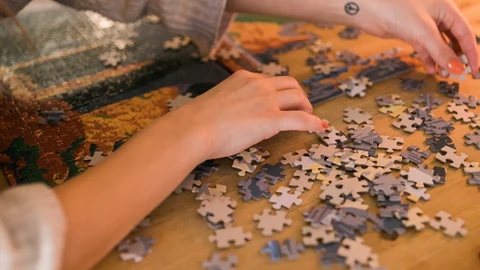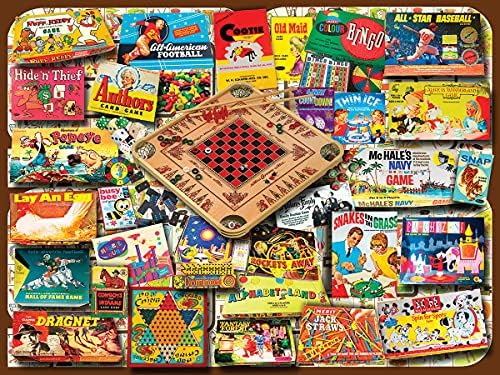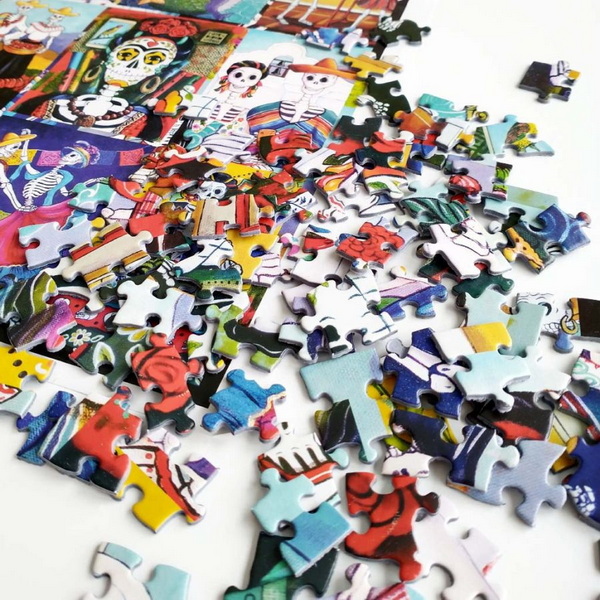Content Menu
● The Origins and Evolution of Jigsaw Puzzles in America
● Top Jigsaw Puzzles Manufacturers in The America
>> Artifact Puzzles
>> Buffalo Games
>> Dowdle Folk Art
>> White Mountain Puzzles
>> Cobble Hill Puzzle Company
>> Ravensburger North America
● Manufacturing Innovations and Sustainability
● Diverse Puzzle Types Offered by American Manufacturers
● The Cultural and Educational Impact of Jigsaw Puzzles
● Conclusion
● FAQ
>> 1. What is the historical origin of jigsaw puzzles?
>> 2. How do modern American puzzle manufacturers ensure environmental sustainability?
>> 3. What types of puzzles do top American manufacturers produce?
>> 4. Which American company is known for laser-cut wooden puzzles?
>> 5. How did the Great Depression influence the popularity of jigsaw puzzles?
Jigsaw puzzles have been a cherished pastime in America for centuries, blending entertainment, education, and art into a single engaging activity. The ongoing popularity of puzzles has fostered a vibrant manufacturing industry in the Americas, where companies combine traditional craftsmanship with modern innovation. This article delves into the top jigsaw puzzles manufacturers in the Americas, exploring their history, manufacturing techniques, product variety, and contributions to the puzzle community.

The Origins and Evolution of Jigsaw Puzzles in America
The history of jigsaw puzzles dates back to the mid-18th century when John Spilsbury, a London cartographer and engraver, created the first puzzle by mounting a map on wood and cutting it into pieces along country borders. Originally called “dissected puzzles,” these early wooden puzzles were educational tools designed to teach geography, primarily to children but also enjoyed by adults of the time. The term “jigsaw puzzle” emerged later, around the 1880s, with the invention of the jigsaw saw, which allowed for more intricate and faster cutting of puzzle pieces.
Jigsaw puzzles gained popularity in the United States around the mid-1800s, initially focusing on educational themes such as maps and religious scenes. After the Civil War, companies like Milton Bradley and Parker Brothers began producing puzzles that combined education with entertainment. The invention of the treadle jigsaw—a foot-powered scroll saw—enabled manufacturers to create more complex shapes efficiently, fueling a puzzle boom in the late 19th and early 20th centuries.
The Great Depression marked another surge in puzzle popularity in America, as puzzles provided affordable, long-lasting entertainment. During this period, cardboard puzzles became more common, replacing wooden ones due to lower costs and easier mass production. The 20th century saw the rise of figure-shaped pieces, interlocking designs, and themed puzzles, establishing the jigsaw puzzle as a mainstream hobby enjoyed by all ages.
Top Jigsaw Puzzles Manufacturers in The America
Artifact Puzzles
Artifact Puzzles is a boutique American company renowned for its laser-cut wooden puzzles. Their puzzles feature intricate designs and unique, whimsical piece shapes that challenge even the most experienced puzzlers. Artifact offers two main lines: a glossy printed finish and the Ecru line, which uses matte finishes on natural plywood. The company emphasizes sustainability by using eco-friendly plywood and soy-based inks. Artifact puzzles are collectible art pieces as much as they are puzzles, appealing to enthusiasts who value craftsmanship and environmental responsibility.
Buffalo Games
Buffalo Games, based in Buffalo, New York, is one of the leading American puzzle manufacturers. Known for producing puzzles with vibrant artwork and durable, thick pieces, Buffalo Games offers a broad range of puzzles suitable for all skill levels. Many of their puzzles are made in the USA, supporting local manufacturing. Their product line includes traditional rectangular puzzles, large-piece puzzles for children, and puzzles with reference images to assist assembly, making them accessible and enjoyable for families and serious puzzlers alike.
Dowdle Folk Art
Founded by artist Eric Dowdle, Dowdle Folk Art specializes in puzzles that feature folk art scenes and cultural landmarks. Manufactured in Lindon, Utah, these puzzles are celebrated for their detailed, hand-painted artwork that captures Americana and everyday life with warmth and authenticity. Dowdle puzzles are popular both as challenging puzzles and as decorative art once completed, bridging the gap between entertainment and cultural preservation.
White Mountain Puzzles
White Mountain Puzzles, headquartered in New Hampshire, is famous for its nostalgic and Americana-themed puzzles. Their puzzles range from 500 to over 1,000 pieces and are distinguished by thick, sturdy pieces that fit together smoothly. White Mountain also offers uniquely shaped puzzles, including circular puzzles and state-shaped puzzles, adding variety and challenge. Their themes often evoke nostalgia, featuring vintage advertisements, historic scenes, and pop culture icons.
Cobble Hill Puzzle Company
Though based in Canada, Cobble Hill puzzles enjoy widespread popularity throughout America. Cobble Hill is known for high-quality puzzles with precise cutting and beautiful artwork. The company prioritizes environmental sustainability by using recycled materials and soy-based inks. Their puzzles cover a wide range of themes and difficulty levels, appealing to both casual puzzlers and serious collectors.
Ravensburger North America
Ravensburger, a German company with a strong North American presence, is synonymous with premium puzzle quality. Their puzzles feature thick, durable pieces with precise cuts and vibrant images. Ravensburger offers puzzles for all ages, including children's puzzles, challenging adult puzzles, and innovative 3D puzzles. Their commitment to quality and innovation has made them a staple in American households and puzzle collections.

Manufacturing Innovations and Sustainability
Top jigsaw puzzles manufacturers in America have embraced technological advancements such as laser cutting and computer-aided design to create puzzles with intricate shapes and flawless piece fitting. Laser cutting allows for unique piece shapes, including whimsical and thematic pieces that enhance the puzzle experience.
Sustainability has become a key focus, with many companies using eco-friendly materials like soy-based inks, recycled paper, and sustainable plywood. This commitment not only reduces environmental impact but also appeals to a growing demographic of environmentally conscious consumers.
Diverse Puzzle Types Offered by American Manufacturers
The top manufacturers in America offer a wide variety of puzzle types to suit different preferences and skill levels:
- Traditional flat puzzles: Ranging from a few hundred to several thousand pieces, these are the most common type.
- 3D puzzles: Made from wood or foam, these puzzles form three-dimensional objects, adding a sculptural element.
- Large-piece puzzles: Designed for children or those with dexterity challenges, these puzzles have fewer, larger pieces.
- Themed puzzles: Featuring art, nature, landmarks, pop culture, and folk art, these puzzles cater to diverse interests.
- Custom puzzles: Many manufacturers offer personalized puzzles for gifts, promotions, or special events.
The Cultural and Educational Impact of Jigsaw Puzzles
Jigsaw puzzles have long been valued for their educational benefits. They help develop spatial reasoning, concentration, and problem-solving skills. Historically, puzzles were used to teach geography, history, and other subjects, a tradition that continues today with educational puzzle maps and themed puzzles.
Culturally, puzzles reflect societal trends and artistic movements. For instance, folk art puzzles preserve traditional American scenes, while nostalgia-themed puzzles evoke memories of past eras. The puzzle industry's evolution mirrors technological advances and changing consumer tastes, making puzzles a unique intersection of art, education, and recreation.
Conclusion
The top jigsaw puzzles manufacturers in the Americas represent a rich heritage of craftsmanship, innovation, and artistic expression. From the historical roots of wooden dissected maps to the modern laser-cut masterpieces, companies like Artifact Puzzles, Buffalo Games, Dowdle Folk Art, White Mountain Puzzles, Cobble Hill, and Ravensburger North America have elevated the puzzle experience for enthusiasts across the continent. Their dedication to quality, environmental responsibility, and diverse product offerings ensures that jigsaw puzzles remain a beloved pastime that educates, entertains, and inspires.

FAQ
1. What is the historical origin of jigsaw puzzles?
Jigsaw puzzles originated in the 1760s when John Spilsbury created educational map puzzles by mounting maps on wood and cutting them into pieces to teach geography.
2. How do modern American puzzle manufacturers ensure environmental sustainability?
Many use eco-friendly materials such as soy-based inks, recycled paper, and sustainable plywood, along with energy-efficient manufacturing processes.
3. What types of puzzles do top American manufacturers produce?
They produce traditional flat puzzles, 3D puzzles, large-piece puzzles for children, themed puzzles, and custom puzzles for special occasions.
4. Which American company is known for laser-cut wooden puzzles?
Artifact Puzzles is renowned for its laser-cut wooden puzzles with intricate designs and unique piece shapes.
5. How did the Great Depression influence the popularity of jigsaw puzzles?
During the Great Depression, puzzles became a popular, affordable form of entertainment, with mass-produced cardboard puzzles making them accessible to many American families.































